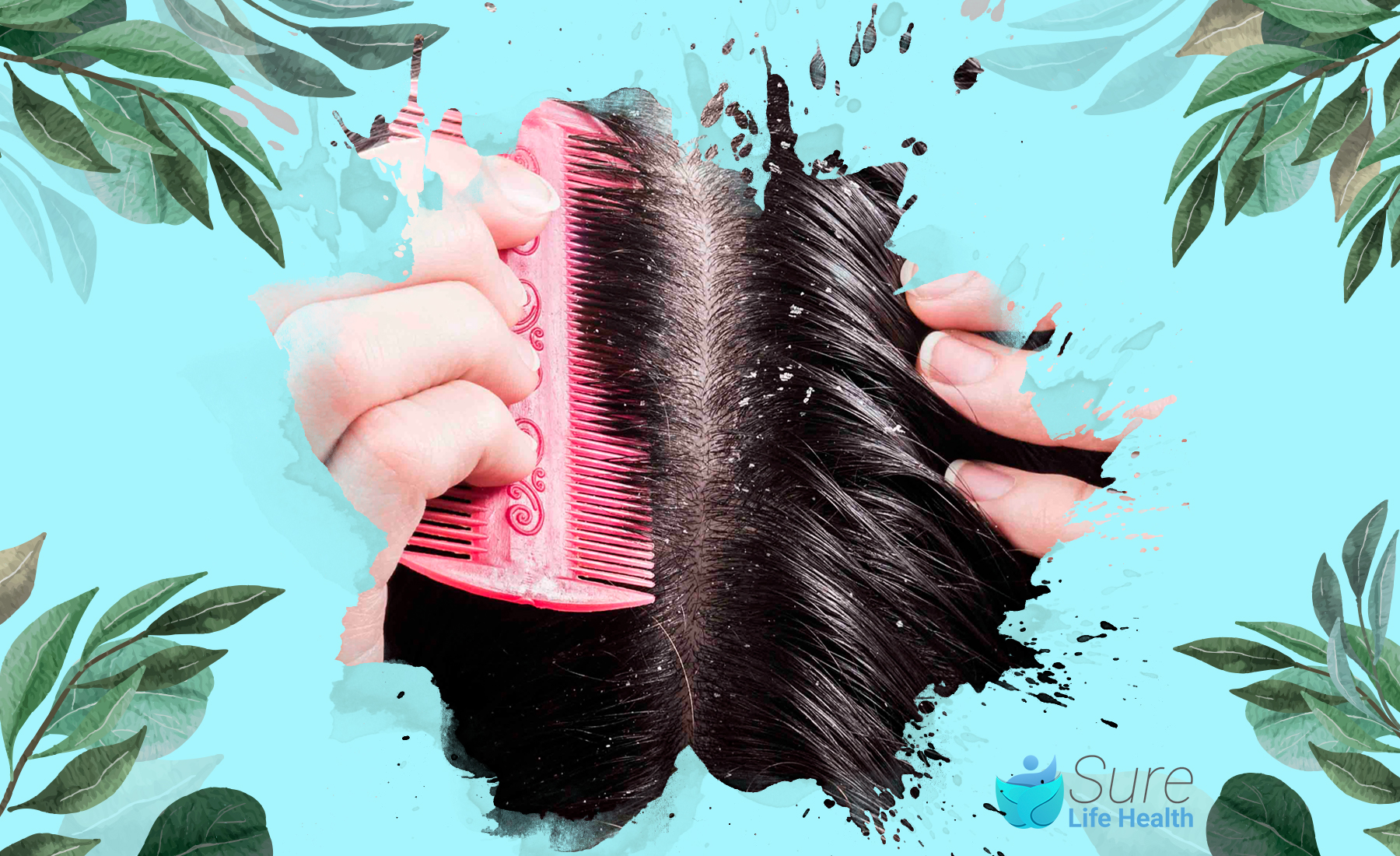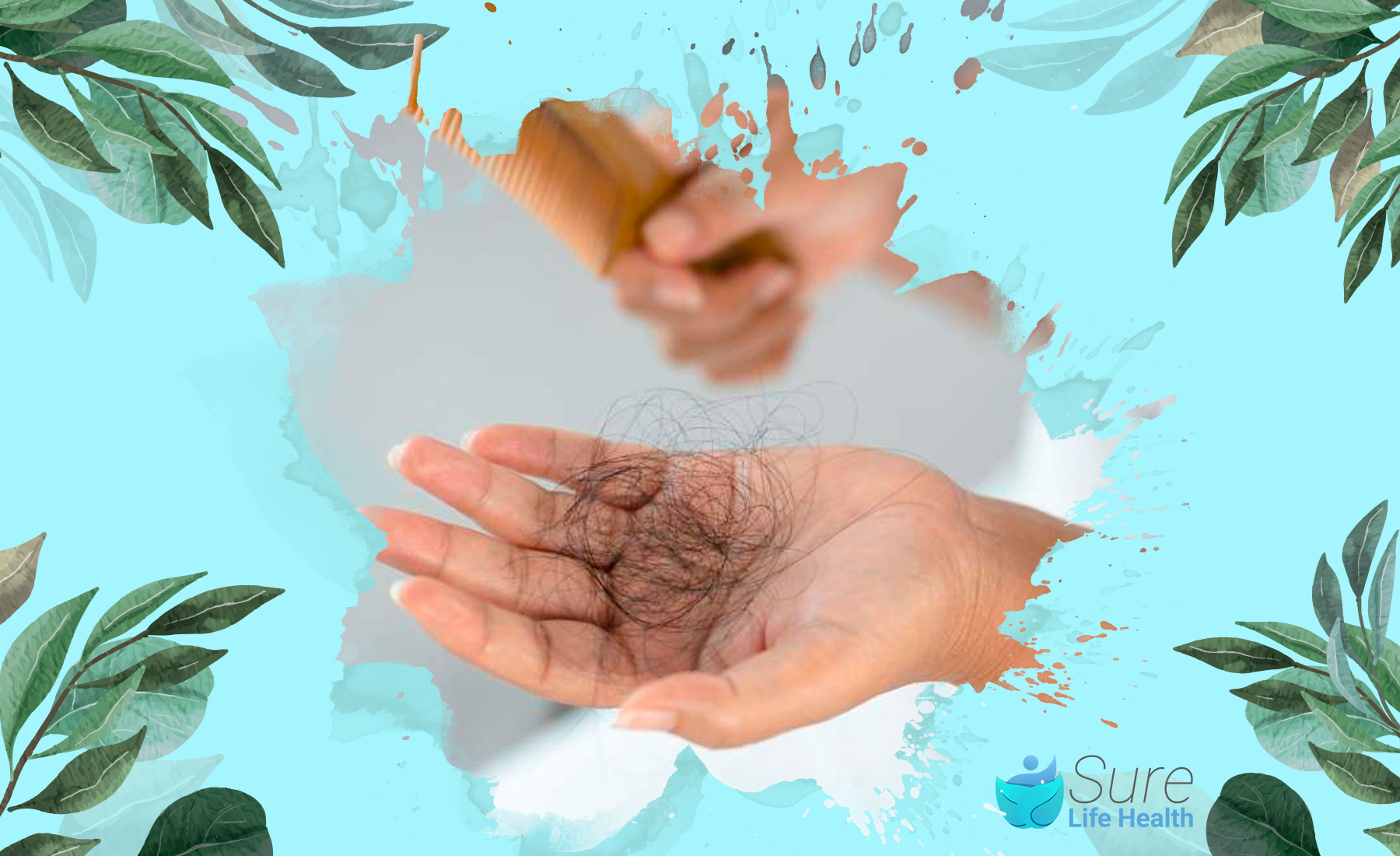Have you heard about the benefits of selenium for hair? This essential trace mineral can promote hair growth and combat dandruff.
Keep reading with Sure Life Health to discover how you can harness the power of selenium for healthier, more vibrant hair.
What Is Selenium?
Selenium is a trace mineral found in soil, water, and certain foods. This essential nutrient is present in foods such as meat, vegetables, nuts, seafood, bread, eggs, and cereals.
While the body only needs small amounts of selenium to function properly, it is crucial for overall health. Selenium supports the immune system and is vital for the metabolism of thyroid hormones.

Does Selenium Promote Hair Growth?
Selenium appears to be an effective treatment for hair loss. Many individuals experiencing telogen effluvium take selenium supplements to aid hair regrowth. The body relies on trace minerals like selenium to support hair growth.
This mineral is essential for various enzymes that catalyze numerous chemical reactions in the body. Some of these enzymes are antioxidants, which help the body eliminate free radicals that cause premature aging and weaken hair follicles. By neutralizing these free radicals, selenium promotes healthy hair growth.
Benefits Of Selenium For Hair
Here are some benefits of selenium for hair that you may want to know.
Enhances Hair Texture
Selenium can improve hair texture by promoting healthy hair follicles and reducing scalp inflammation. Healthy follicles produce strong, resilient hair that is less prone to breakage and split ends.
Additionally, selenium can enhance the appearance of dry or dull hair, making it look shinier and more lustrous.

Encourages Hair Growth
Selenium is vital for maintaining healthy hair. It aids in the production of selenoproteins, essential components for promoting and sustaining hair growth.
Selenium also regulates hormone production that can impact hair growth, such as balancing dihydrotestosterone (DHT) levels, which is known to contribute to hair loss.

Remedies Dandruff
Selenium can help reduce dandruff by lowering scalp inflammation and improving hair follicle health. Dandruff is often caused by an overgrowth of yeast on the scalp, leading to inflammation and flaking.
Selenium’s antifungal properties help curb yeast growth, preventing dandruff and other scalp issues.

Stops Hair Loss
Selenium can prevent hair loss by strengthening hair follicles and reducing scalp inflammation. Inflammation can damage hair follicles, leading to hair loss, so reducing it helps maintain healthy and strong hair.
As an antioxidant, selenium reduces oxidative stress, protecting hair follicles from free radical damage.

How to Consume Selenium for Hair Health
Harness the benefits of selenium hair growth with these consumption methods to ensure your hair is nourished from within.
Eating a Diet Rich in Selenium
You can benefit from selenium by incorporating a variety of foods into your diet. Read below to see selenium-rich foods that you can use in your diet.
Selenium Supplements
For those who follow a vegan diet or find it difficult to consume selenium-rich foods, supplements offer an effective alternative.
Vegan selenium supplements ensure you meet your selenium needs without compromising on nutrition.
Best Natural Sources of Selenium
The benefits of selenium for hair can be unlocked by consuming the right foods. Here are some selenium-rich foods to incorporate into your diet for healthier hair:
- Brazil nuts
- Sunflower seeds
- Fish (tuna, halibut, sardines)
- Turkey
- Chicken
- Eggs
- Whole grains (brown rice, whole wheat)
- Spinach
- Cottage cheese
- Lentils
- Mushrooms, especially shiitake and white button varieties
- Enriched macaroni
- Lima and pinto beans
- Oatmeal

Long-term Safety of Selenium Use
Selenium can be possibly unsafe when taken in high doses or over a prolonged period. Consuming doses above 400 mcg daily can increase the risk of selenium toxicity.
Even lower doses taken over an extended period may elevate the risk of developing diabetes.
Safety of Daily Selenium Intake
While selenium is essential for health, it’s important to stay within safe intake limits. The safe upper limit for selenium in adults is 400 micrograms per day. Exceeding this amount can lead to an overdose.
If you’re unsure about how much selenium you should take, consult with your doctor or healthcare provider. They can determine if you have a deficiency and suggest an appropriate supplement dosage if needed.
Side Effects Of Selenium For Hair Loss Treatment
Taking an excessive amount of selenium over a long period can lead to selenium toxicity. In one study, 72% of 200 people who took a dietary supplement containing 200 times the listed selenium content experienced toxicity. Selenium toxicity-induced hair shedding can range from diffuse thinning to alopecia universalis, depending on the ingested amounts.
The symptoms of selenium toxicity can be moderate to life-threatening. If you suspect selenium poisoning, contact your healthcare provider immediately.
Severe Gastrointestinal and Neurological Symptoms of Selenium Toxicity:
- Muscle tenderness and tremor
- Fatigue and irritability
- Tooth decay and mottling
- Brittle nails and hair
- Significant hair loss
- Acute respiratory distress syndrome
- Kidney failure
- Rarely, heart failure or heart attacks
- In extreme cases, death
Conclusion
In short, the benefits of selenium for hair are within your reach. By incorporating selenium-rich foods into your diet, you can enhance your hair’s strength, texture, and overall health. Just be mindful not to exceed 400 mcg of selenium per day to avoid toxicity. If you have any doubts or experience discomfort, consult with a doctor.
Feel free to share any other hair-related problems that are troubling you in the comments. We’re here to help!
Don’t forget to explore more informative and helpful blogs from Sure Life Health, where we continue to uncover the best in natural health care.
Professor Gaye Cunnane, PhD, MB, FRCPI
As the Director of Health and Wellbeing at RCPI, Professor Gaye Cunnane is at the helm of initiatives aimed at enhancing the health and well-being of RCPI Trainers and Trainees. Her role extends beyond administration; she is also a respected clinical professor of rheumatology and a consultant rheumatologist at Trinity College Dublin (TCD) and St James’s Hospital. Prof. Cunnane’s medical journey began at TCD, where she graduated from medical school, and her path has been marked by both clinical and academic excellence.
After completing her basic clinical training in medicine, she embarked on PhD studies at University College Dublin and St Vincent’s University Hospital. Her research during this period was focused on prognostic markers in early inflammatory arthritis, a project that saw her collaborating with esteemed universities across Europe, including in Switzerland, The Netherlands, the UK, and Sweden.
Prof. Cunnane’s career took her to the University of California, San Francisco, where she spent three years delving into research on new treatments for lupus. Her academic prowess led her to the University of Leeds in 2001 as a senior lecturer, before returning to Ireland in 2003 to assume her current roles. She has also served as the National Specialty Director for Rheumatology training in Ireland, Programme Director for Basic Specialist Training with RCPI, and as a past President of the Irish Society for Rheumatology.
PUBLISHED ARTICLES
“Rheumatic disease differentiation using immunoglobulin G sugar printing by high-density electrophoresis”: Published in The Journal of Rheumatology, this study reflects her in-depth investigation into rheumatic diseases.
“Benefits of exercise in patients with rheumatoid arthritis: a randomized controlled trial”: This research work, highlighting the positive impact of exercise on rheumatoid arthritis, underscores Prof. Cunnane’s dedication to practical, patient-centered research.
Additionally, Prof. Cunnane has made notable contributions to the Annals of the Rheumatic Diseases, discussing early referral, diagnosis, and treatment of rheumatoid arthritis. She has also been involved in a study on the NCBI platform investigating exercise benefits in rheumatoid arthritis patients.
Professor Gaye Cunnane’s career is a testament to her commitment to improving patient outcomes in rheumatology through rigorous research, clinical excellence, and dedicated teaching. Her work continues to influence the field of rheumatology, both in Ireland and internationally.

